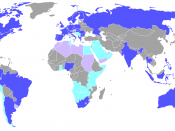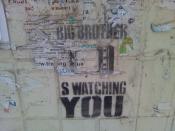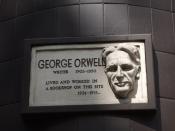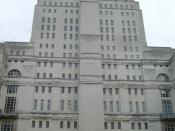If life is but a dream, do we ever wake up? Or are dreams just a fragment of our imagination? Do they hold any relevance to our inner most desires and thoughts? Revealing one's character or repressed feelings can be known by in our dreams. In the totalitarian society of the novel Nineteen Eighty-Four by George Orwell, the main character Winston Smith relies on his subconscious mind to maintain his sanity.
Winston works for the Party rewriting the past in a department called the Ministry of Truth. His memories of the past are usually the opposite of the Party's version. Winston finds himself confused about whether or not he is losing his mind. His dreams reveal the reality of the Party and the truth about the past, enabling him to trust his own instinct.
Winston's first dream is in Part One, Chapter Three. He dreams of his mother and his baby sister sinking down away from him, in some way giving their lives so he could survive.
He barely remembers his family. But Winston feels as though his mother's death was a particular tragedy that he is responsible for. This dream leads Winston to recall his family. He realizes that in those times if you loved someone, you loved them from the bottom of your heart, no matter what. If you had nothing else to give, you gave love. Contrasting that with the present day, current political events have begun to swallow up families as Ingsoc (or English Socialism) is taking over the nation. Winston recognizes that the Party persuades you to think that impulses and feelings are unimportant, ultimately robbing you of your power. Winston also realizes that the past can be erased. Individuals can vanish as he aware of working for the Party. "People simply disappeared, always during the night. Your name was removed from the registers, every record of everything you had ever done was wiped out, your one time existence was denied and then forgotten." (Orwell 21) Winston had another dream about his family. It takes place in the glass paperweight that he purchased at an antique shop (Part One, Chapter Eight). He was a young boy and London was a disaster area of starvation, violence and unrest. His father disappeared and so his mother, baby sister and himself lived in poor housing with hardly enough to eat. Winston demanded more food even though his mother would automatically give him the biggest portion. One day there was a chocolate ration, his mother gave him three fourths of the piece and the rest to his sister. But Winston grabbed the piece from his sister and roamed around the town. When he came back a few hours later, they both had disappeared.
Winston's dreams play an important role in unfolding needs and desires. Without expressing his needs and desires Winston would lose his mind and become vulnerable to the Party. Thus enabling the Party to control Winston entirely. His mother's reaction shows his relationship of love with the past and his longing for past times and attitudes. Winston's memory of the times right before he lost his mother illustrate the historical turbulence leading up to this point. This shows a clearer picture of the economic situation emerging. Winston went through the struggle of starvation and losing his family. This is makes him realize that the proles are in some ways superior to himself and other Party members, because they have maintained their humanity and their dignity. The idea of the proles persevering despite, the trying times, allows him to retain control of his mind but more importantly it gives him faith. "If there was hope, it must lie in the proles, because only there, in those swarming disregarded masses, 85 per cent of the populatio of Oceania, could the force to destory the Party ever be generated." (72) Winston does not merely dream of his family and past events. He fantasizes about "the Golden Country". The "Golden Country" is a place with pastures, trees swaying in the wind and a clear sparkling stream. This place represents Winston's ideal, where he can be at peace and not constantly dodging the Party and its tactics. The fact that Winston thinks about this in his subconscious mind is significant because he believes (as stated in Chapter Two) that the only thing you own is your brain and your thoughts. So his dreams allow him freedom from the totalitarian world in which he lives. They represent history, and the independence associated with history. The existence of the Thought Police is testament to the Party's determination to control people's thoughts as well. The Thought Police can see everything. They are capable of finding his thoughts through his diary, "DOWN WITH BIG BROTHER" (20). But they cannot see Winston's inner beliefs giving him sovereignty. So he may go anywhere and think anything while dreaming as long as his outward behavior remains neutral.
Winston's dreams of the "Golden Country" also foreshadow his love affair with Julia, the dark-haired girl. He dreams of her coming towards him and in one graceful, careless gesture, tearing off her clothes and throwing them aside. Winston, however, feels no desire for her. Instead he feels a strong admiration for Julia's rebellious nature, which is almost like Winston's mother's love. Again these feelings about Julia permit Winston to act freely without feeling scrutinized by the Thought Police.
After Winston wakes from his dreams he sees further the power of the Party. He begins to question his sanity and the truth of the Party. Through his dreams Winston realizes the Party has destroyed the personal values of family, honour and love and replaced them with blind loyalty to Big Brother. Winston depends on his dreams to distinguish between fact and fiction. He realizes that his memories were all he had to hold on to remain in a state of good health. Only in his dreams was he able to escape and be truly free from tyranny of the Party, Thought Police and Big Brother.





